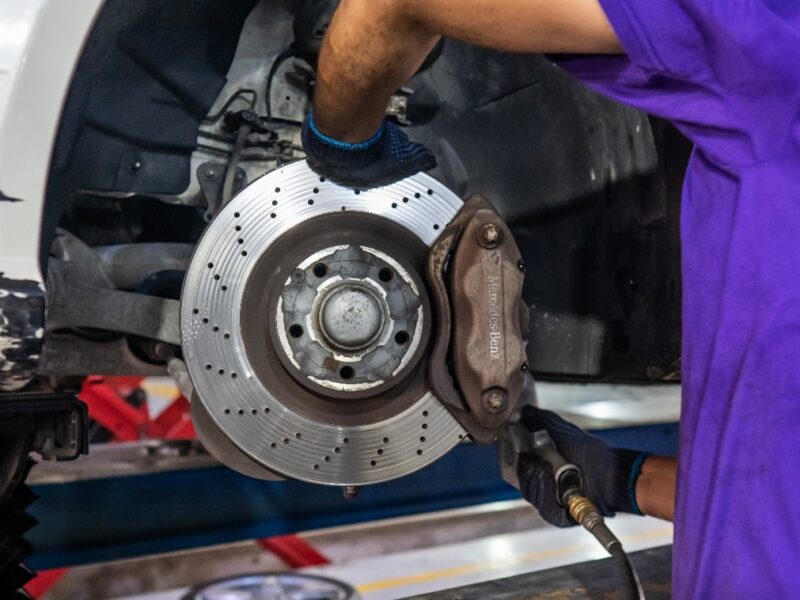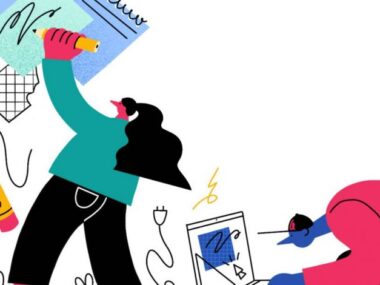If you’re experiencing any of the following problems with your car’s brakes, it’s time for auto brake repair: noise when braking, decreased stopping power, brake fluid leakage, and pedal vibration. Brake pads and rotors should be inspected every 10,000 miles or as recommended by your car’s manufacturer. Bring your car into a trusted mechanic to have these issues assessed and repaired if necessary. Neglecting brake repair can result in serious accidents. Keep yourself and your loved ones safe by addressing any problems with your car’s brakes as soon as possible.
-
Noise When Braking
When you brake, the car should stop quickly and smoothly. A grinding or squeaking sound when braking may indicate that it’s time for new brake pads and rotors. Grinding sounds mean that your brake pad metal is coming into contact with your rotor. Squealing can be a sign of glazed, worn, or rusted rotors, which cause brake pads to vibrate against them. Both situations will compromise stopping power and put drivers in danger if their brakes don’t work well when needed most—in an emergency situation on the road.
If you notice a grinding sound while braking, pull over immediately and have your car towed to a mechanic for inspection. Don’t drive home from this much-needed brake service; if you do, you risk damaging other components. If your car has been making a grinding sound every time you brake, the mechanic will inspect the rotors and pads to determine if one or both need replacement.
-
Decreased Braking Power
Another sign that auto brake repair is needed is decreased braking power when coming to a stop – even with your foot on the brake pedal. If you find yourself pushing the brake harder than usual when stopping, your pads may be thinning out and need to be replaced.
Replacing brake pads is much less costly than having other components repaired due to overuse, so if you feel that you’re pressing harder on the brake pedal than normal, get them checked carefully.
-
Brake Fluid Leakage
Brake fluid leakage often indicates a problem with one of the most important parts of your braking system: your master cylinder. When this component malfunctions or becomes faulty, it can lead to decreased stopping power and possibly cause injury or accidents during a stop situation on the road.
The average life span of a master cylinder is about 10 years. If you notice brake fluid on the ground underneath your car, your master cylinder may be failing.
-
Pedal Vibration
Another sign that you need auto brake repair is pedal vibration when pressing your brakes. This feeling isn’t normal, so consult a trusted mechanic if it happens to you while braking—it’s not something to ignore in the name of saving time and money on maintenance costs.
Pedal vibrations can indicate warped rotors, which put drivers at risk for crashes since they reduce the stopping power of their brakes. Vibrations can also indicate a problem with your car’s brake fluid or the brake pads themselves.
While ignoring signs for auto brake repair isn’t advisable and could be expensive, not having enough money to get your brakes fixed can mean putting yourself at risk and other motorists on the road. Fortunately, Courtesy Automotive Service provides quality auto part products and accessories at prices that almost anyone can afford. The next time you feel like pressing harder on your pedal while braking, make an appointment for a brakes check-up instead—it’s better to know your brakes are in good health than to run the risk of having them fail unexpectedly when they’re needed most.
-
Spongy Braking Feel
Sponginess in the braking feel can be another sign that auto brake repair is needed. If your brakes are not working properly, the pedal will feel soft or spongy. The cause of this issue can often be traced to faulty or damaged brake pads or old brake fluid. It’s important to address this problem before it leads to serious consequences on the road.
-
Low Pedal Travel
A low amount of travel between when you start pressing down on the brake pedal and when you press it all the way down is also a sign of potential issues with your braking system.
In order to stop your car properly, the brake fluid has to travel from the master cylinder to each individual caliper. If air is trapped in this system, you’ll have a low amount of pedal travel before the brakes activate.
-
Grinding or Squealing Sounds
Grinding or squealing sounds while braking may indicate a problem with your brake pads or rotors. That constant grind means it’s time for new brake components as soon as possible—the longer you put off auto repair work on those parts, the closer will come to being destroyed.
As your brake pads wear down, the metal parts inside of them get closer to other elements in your brake system. The constant movement could cause your rotors to warp or become uneven—a condition that will lead to significant loss of braking power and should be immediately addressed.
-
Vibrating Steering Wheel
Your vehicle’s steering wheel shouldn’t shake while you’re behind the wheel. If you notice a shaking motion when you stop, this could indicate warped brake rotors, which put your life and everyone else on the road at risk.
-
Different Brake Pedal Feel on Each Braking Stop
Different brake pedal feels while you are braking indicate a problem with your car’s brake fluid or the brake pads themselves. If you notice an issue, bring your car to AutoZone for a free car safety inspection so our team can recommend the proper auto repair services.
-
Loss of Antilock Braking System (ABS)
If you lose ABS, this is another indicator that your brakes need attention as soon as possible—putting off auto brake repair could lead to costly damage to expensive components of your braking system, including calipers and rotors. Additionally, if the electronic stability control light comes on when accelerating over rough surfaces or traveling at higher speeds, this is a sign that the ABS has been turned off. It’s important to have brake issues checked out right away – especially because many states require drivers to have working ABS in order to pass a smog check.


